Primary navigation
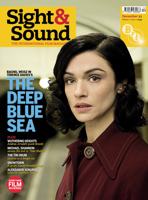
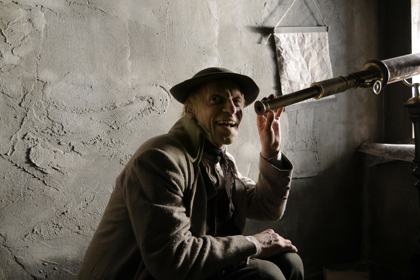
A surprise winner of the top prize at the recent Venice Film Festival, Aleksandr Sokurov’s Faust has divided critics, leaving some groping for superlatives. Here Ian Christie places the film in the context of European high culture’s previous tellings of the tale – and of the Russian director’s other, varied works, now showing in a BFI retrospective
Aleksandr Sokurov’s Faust has opened a real can of worms. The news that it had won the Golden Lion at Venice provoked instant reaction, much of it incredulous, some downright hostile. Hollywood stars and popular commercial films had been snubbed. Worse still, snubbed by a jury headed by the American director Darren Aronofsky. And in favour of what: a high-concept art film? Pretentious stuff, after Cannes giving the Palme d’Or to Terrence Malick’s demanding and no less divisive The Tree of Life.
And yet, wasn’t this Venice reasserting its original role as the oldest film festival in the world, added to the city’s existing Biennale in 1932 to show ‘cinematographic art’ within the wider framework of the other arts? In Sokurov’s case, we might also recall how, 49 years ago, Venice proclaimed the emergence of another Russian master, Andrei Tarkovsky, with the Golden Lion for his first feature Ivan’s Childhood.
Sokurov, however, is no debutant – and nor can he still be pigeonholed as ‘Tarkovsky’s heir’. Indeed he’s probably the most prolific of all contemporary filmmakers, with a non-stop output of features, documentaries and highly personal film-poems. For Variety’s reviewers, he’s mannered, tedious and not a barrel of ‘laffs’. But the Venice award prompted some stirring responses. Nigel Andrews, writing in the Financial Times, declared himself “exalted and astonished” by Sokurov’s film, and hailed it as “complete, magical and accessible to all”. And writers in the blogosphere have reached heights of rhetoric to convey their mixed emotions: “a grueling, attenuated pre-modernity right down to the marrow of Faust, as though narrativity itself were being etched in acid before you” (Michael Sicinski); “wheezing human-blob in a glass, a steaming geyser piercing through an ashen purgatory” (Fernando F. Croce); and “like being trapped in an elevator with Terry Gilliam’s id” (Guy Lodge).
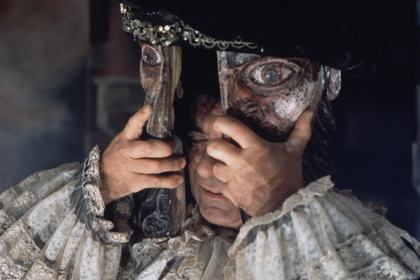
Jan Svankmajer’s 1994 Faust
That last might seem quite relevant, since the most recent manifestation of Gilliam’s baroque imagination was his widely acclaimed production of Berlioz’s The Damnation of Faust earlier this year for the English National Opera. But the main thing Gilliam’s Faust had in common with Sokurov’s is a willingness to tackle boldly one of the great European subjects, undaunted by the reverence that has accumulated around its main monument – the vast philosophical drama that Johann Wolfgang von Goethe laboured on for over 40 years, between 1790 and his death in 1832. Part of the problem facing Sokurov’s Faust is indeed our relative unfamiliarity with Goethe in Anglophone culture, which is partly down to having our ‘own’ Faust in the shape of Christopher Marlowe’s punchy Elizabethan firecracker Doctor Faustus.
It’s that version of the tale, drawing on earlier folk versions, that seems to have shaped the most notable modern Faust on film: Jan Svankmajer’s ferocious 1994 combination of live action and puppetry. Svankmajer’s Faust is given a map in the street in modern-day Prague, which leads him – like Alice (the subject of Svankmajer’s previous feature) – into a labyrinth of the bizarre. Like Marlowe’s hero, he wants Mephistopheles to amaze and gratify him, and the angels and demons are a palpable presence, with the hallucinatory puppet theatre that originally nourished Svankmajer’s imagination recalling the intimate theatre for which Marlowe wrote. And for these everyman Fausts, the salvation that Goethe offered – in the shape of Gretchen – is not an option.
When Goethe as a young man first mapped out what was to become his main creative work, he envisaged an epic treatment that would begin in heaven and ultimately return to somewhere beyond the earthly setting of the central drama. Like Marlowe’s hero, his Faust is tempted by the devilish Mephistopheles, and signs away his soul in return for knowledge and power. But apart from the greater density of the social setting for this Faust, the crucial difference is the love interest, represented by Gretchen. In Goethe, Faust manages to seduce the innocent Gretchen and kill her brother, before abandoning her with their child. After Gretchen drowns the baby, she’s condemned to death and Faust tries to save her; but even though she rejects his help, there’s the promise of heavenly salvation.
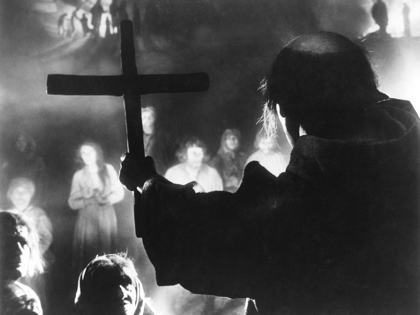
F.W. Murnau’s 1926 Faust
Goethe’s Faust didn’t just become the cornerstone of German literature in the Romantic period, it also inspired the 19th century’s single most popular opera, composed by Charles Gounod in 1859. And naturally for Gounod and his librettists, it was the melodramatic aspects of Goethe that offered scope for building a successful Romantic vehicle. Without Faust’s courtship gift of jewels to Marguerite (as Gretchen becomes in this version) and the final rendezvous in her cell, there wouldn’t have been the opportunity for generations of singers to strut their stuff.
Cormac Newark writes in a recent programme note that George Bernard Shaw, who was a music critic before becoming a playwright, complained that critics had to spend ten years of their lives watching Faust – and would have caught “the inflammatory disease Faustitis” if Gounod’s music hadn’t been so “seraphically soothing”. The statistics are indeed staggering: Faust clocked up 2000 performances in less than a century in Paris, was staged at Covent Garden every season for 50 years, and figures in countless works of fiction from The Phantom of the Opera to The Age of Innocence and even Tintin as the opera. (And for those who want to check for themselves, the New York Metropolitan Opera production will be shown on cinema screens around the world on 10 December).
If this arch-Romantic operatic Faust became a cliché, it’s important to remember how far removed it was from Goethe’s drama of the human soul, described by the aged poet as “tormented by all that afflicts mankind, repelled by all that it finds repellent, and made happy by all that it desires”. And what Sokurov has done is to plunge us into a teeming middle-European milieu that seems extraordinarily close to the one Goethe imagined. This Faust is neither an aged lecher nor a would-be Lothario. In Johannes Zeiler’s selfless performance, he’s an earnest seeker after knowledge, part alchemist and part scientist, a worrier who feels that life is passing him by. The moneylender he visits turns out to be his Mephistopheles, an extraordinary prancing, epicene creation by the Russian performance artist Anton Adasinsky. Together they move through the extraordinary landscape that’s had critics flexing their vocabulary to evoke its sensory extravagance.
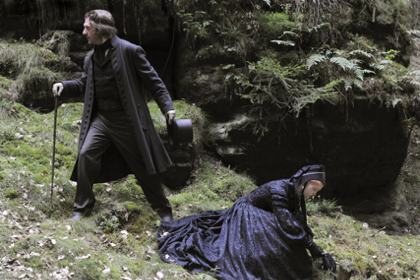
Sokurov’s Faust
Sokurov has always been a filmmaker of immense and intense visual invention – as will become apparent to anyone following BFI Southbank’s retrospective through November and December. From the antique-shop jumble of his George Bernard Shaw fantasy Mournful Indifference (aka Heartbreak House/Anaestesia Psychica Dolorosa, 1987) and the bleached apocalyptic landscape of Days of the Eclipse (Dni zatmeniya, 1989), through the contrasting painterly settings of Mother and Son (Mat i syn, 1997) and Moloch (1999), he has created highly distinctive visual worlds. In many ways, his best-known film Russian Ark (Russkiy kovcheg, 2002) is also his least typical, as it mostly features the decor of St Petersburg’s Hermitage Palace (although with some deft digital enhancement). And while he’s capable of working with the simplest tools and settings, especially in some of the highly personal ‘elegies’ that provide a counterpoint to his feature-film career, he is not afraid to embrace the opportunity for comprehensive ‘world building’ that digital cinema now offers.
Hence, no doubt, the choice as cinematographer for Faust of Bruno Delbonnel, best known for his work on such stylised films as Amélie and Julie Taymor’s Across the Universe, as well as Harry Potter and the Half-Blood Prince. Sokurov has clearly been encouraged to broaden his palette by his producer Andrei Sigle who, unusually, is also a composer, and has here created a soundscape that weaves together medieval German music, Wagner, Tchaikovsky and Sokurov’s beloved Mahler. When Sigle claims for the film that “the lighting, colour, space, pauses and breathing in some sequences create an absolutely unusual spectacle”, this is more than production hype. Faust does indeed create a world as magical and mysterious as any recent mass-market fantasy film; and in doing so it evokes the tremendous range of references and detail that Friedrich Wilhelm Murnau brought to his great silent Faust of 1926 – the film, incidentally, that led to him being given carte blanche in Hollywood.
But the most intriguing question that’s now up for discussion is how Faust – which completes Sokurov’s ‘tetralogy of power’ – relates to the director’s previous three films about infamous political leaders of the early 20th century. The linking theme had seemed to be an exploration of how ‘unhappy people’ can create unhappiness on a vast scale, as in the case of Hitler (Moloch, 1999) and Lenin (Taurus, 2001), both of whom are seen in their private lives as diminished, almost pathetic characters. With The Sun (Solntse, 2005), Sokurov’s equally intimate portrait of the last days of Hirohito’s rule as god-emperor, he seemed to be dealing with the confrontation between the mythic and the mundane – in a way not dissimilar to Scorsese’s treatment of the Dalai Lama in his underappreciated Kundun. There had been speculation about another biographical film to complete the tetralogy, but few can have expected this leap into a fully realised period myth.
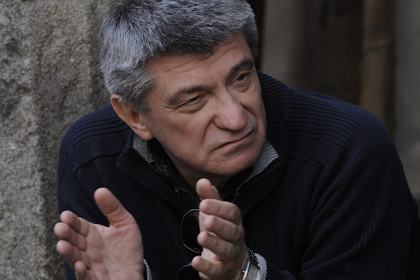
Aleksandr Sokurov
Sokurov has spoken of Faust as continuing to “delve into everything that is dark in man”, and exploring “a pathological unhappiness in everyday life”. But the most striking difference, as he observes, is that the other rulers are shown confronting their own mortality, while Faust – true to Goethe’s vision – is forgiven his blasphemous pact and offered power. In Sokurov’s words – and even more in the film’s final, transcendent images – “he walks off in order to become a tyrant, a political leader, an oligarch”. Are we then to see Faust as probing the roots of the superman or übermensch that Nietzsche celebrated in Thus Spoke Zarathustra, which would later be distorted by 20th-century tyrants?
Goethe was not only a poet but a polymath and politician who tried to balance Enlightenment rationalism with a rising tide of Romanticism. When he began exploring the Faust legend, he claimed to have no idea where it would lead; by the time he reached Faust’s final experiences beyond space and time, the play had become a mystical celebration of redemption and renewal where “Earth’s insufficiency… finds fulfilment.” Granted that Sokurov’s Faust doesn’t claim to be faithful to Goethe, there’s no mistaking how closely it locates this struggling scientist, seen carrying out gory dissection on a corpse and peering through a telescope at the moon, in the liminal world that the Enlightenment sought to rationalise.
Goethe’s Faust craves knowledge and fulfilment to become a superior being, which leads to the famous Faustian bargain with the devil, for which he is punished but also partially forgiven. But for Nietzsche, God is dead and so too is the Devil. What remains is the drive towards ever greater power – as he says mockingly in Zarathustra, “I suspect you would call my Superman a Devil.” By returning to this most often invoked myth that speaks to our post-Enlightenment world, Sokurov is trying to address the ‘will to power’ that he sees still at work in the post-communist world. The theme is universal, but a veteran Russian critic, Valery Kichin, has been quick to characterise this Faust in Russian terms: “Faust in Sokurov’s interpretation is absolutely devoid of any romantic features. He is a cynic and a hard-core utilitarian of the post-Soviet time when people were ready to step over corpses in order to achieve their goal with a cynic conviction that they knew how to change the world.”
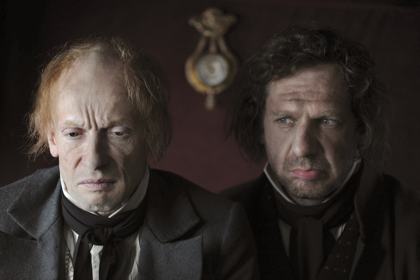
Sokurov’s Faust
Does this talk of politics and philosophy make him sound like an earnest bore? Well, it shouldn’t, since Faust shows Sokurov at the height of his ambition as a filmmaker. Impelled by the same restless curiosity as Rossellini – in his great series of films about philosophers – or the sadly missed Raúl Ruiz – boldly creating new filmic forms to explore art, politics and ideas – Sokurov is surely one of the brightest hopes for believing that cinema can still achieve its full potential as a form of ‘total art’. He himself has often spoken in the past about film as a minor art, subsidiary to the older traditions of literature and painting. But with Faust he has shown cinema capable of – and this may seem blasphemous, or just pretentious – standing alongside Goethe. As Darren Aronofsky said in Venice: “There are films that change you forever and this is one of them.”
An Aleksandr Sokurov retrospective plays throughout November and December at BFI Southbank, London
Five (not) by Ben Rivers: the British filmmaker tells Kieron Corless his hits of the London Film Festival, including Faust (October 2011)
Feminism Russian style?: Angelina Nkonova talks to Carmen Gray about her Twilight Portrait (October 2011)
Red skies: James Blackford on the history of Soviet science fiction (July 2011)
You must be joking: Guido Bonsaver on Roberto Rossellini’s Francis, God’s Jester (May 2007)
The Sun: Geoffrey Macnab on Sokurov’s Hirohito portrait The Sun (September 2005)
Father and Son reviewed by Tony Rayns (October 2004)
Father Russia: Julian Graffy on Sokurov’s Father and Son (September 2004)